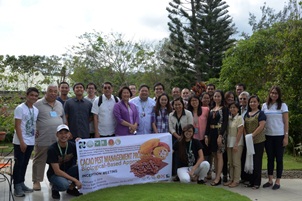 Five agencies began research initiatives on biological-based approaches for cacao pest management following an inception meeting held recently at the De La Salle Science and Technology Complex in Biñan, Laguna.
Five agencies began research initiatives on biological-based approaches for cacao pest management following an inception meeting held recently at the De La Salle Science and Technology Complex in Biñan, Laguna.
These agencies include the De La Salle University-Manila, National Institute of Molecular Biology and Biotechnology-University of the Philippines Los Baños (BIOTECH-UPLB), Philippine Center for Postharvest Development and Mechanization (PhilMech), Bureau of Plant Industry-Davao National Crop Research and Development Center (BPI-DNCRDC) and the Cocoa Foundation of the Philippines.
The research is expected to benefit the local and international chocolate industry following reports on declining chocolate supply.
Experts attribute the shortage to the ageing cacao stands in key cacao producing areas, adverse impact of climate change, and presence of pests and diseases.
Production decline in top chocolate producing regions provides opportunities for other countries like the Philippines to fill in the deficit.
The Philippines has around 17,300 hectares of land planted with cacao, mostly backyard gardens or smallholder plantations. Mindanao, on the other hand, has large farms that account for 90% of the total country production of cacao.
One of the concerns of the cacao commodity is the inadequate support to integrated pest management (IPM) as pointed out during the Conference on Integrated Pest Management in the Asia Pacific Region held in 1991.
Around 80% of cacao growers in the country are smallholders. For them, combating pests and diseases is a bigger challenge compared to larger plantations, which has funds and technical experts to address these problems.
The cacao pest management research, led by program leader Dr. Divinia M. Amalin of DLSU, seeks to develop biological-based pest management strategies to control major insect pests and diseases that will benefit smallholders.
There are four insect pests and diseases of cacao in the Philippines. These are the cacao pod borer, cacao mirid bug, black pod rot, and vascular streak dieback. Infestation of these pests leads to high annual losses in cacao production, affecting both farmers and related businesses.
The program will develop an IPM covering the four prevalent pests. It will delve on the use of biological approaches like biopesticides, semiochemicals, nanobiosensors, particle film technology, and biological control agents.
The research will maximize the potential of available natural resources which may have the ability to fight and eliminate insect pests and diseases that threaten cacao, which is a more sustainable alternative to chemical-based pesticides. In sum, it promotes the balance between increasing crop productivity and environmental protection.
